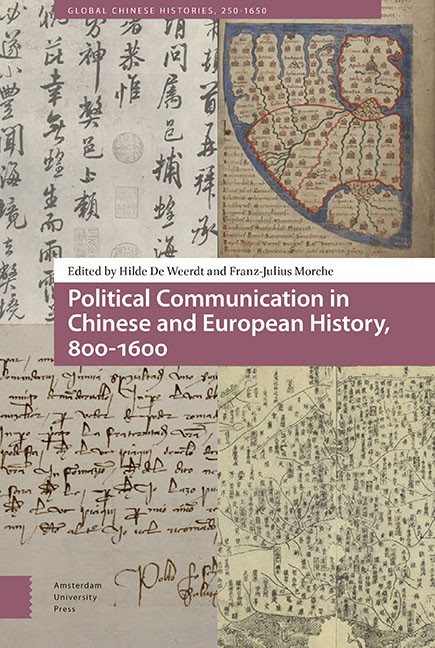Book contents
- Frontmatter
- Dedication
- Contents
- List of Figures and Tables by Chapter
- Acknowledgments
- Introduction
- Part I Communication and the Formation of Polities
- Part II Letters and Political Languages
- Part III Communication and Political Authority
- Part IV Memory and Political Imaginaries
- Epilogues
- List of Contributors
- Index
1 - Communication Breakthroughs: Conditions and Consequences
Published online by Cambridge University Press: 17 June 2021
- Frontmatter
- Dedication
- Contents
- List of Figures and Tables by Chapter
- Acknowledgments
- Introduction
- Part I Communication and the Formation of Polities
- Part II Letters and Political Languages
- Part III Communication and Political Authority
- Part IV Memory and Political Imaginaries
- Epilogues
- List of Contributors
- Index
Summary
It has been calculated that in the German part of the Holy Roman Empire the production of handwritten books increased by roughly 25 per cent per decade between 1370 and 1470, from 20,000 annually in 1370 to 200,000 by 1470. No wonder that efforts were made to find more efficient methods of reproduction. Fifty years after the first Gutenberg Bible, 2 million books were printed in the same area in the decade around 1500. A minimum of 5 million manuscript books may have been produced in west and central Europe as a whole during the fifteenth century, but between 1454 and 1500, no less than 12.5 million books were printed. While these were impressive figures for Europe, a comparable level of communicative capacities had been attained four centuries earlier in Song China, where gazettes were circulated through the empire on a massive scale. The differences of chronology and dimensions don't matter as much as the questions of how a qualitative leap forward could be reached after a period of steady quantitative progression, and what impact the same technological innovation had in different environments.
The present volume offers a rich array of micro-historical case studies and general parallels inspiring further reflections on fundamental characteristics of Chinese and European cultures. Systematic comparison sharpens the insight into the conditions leading to their differentiated developments. I will f irst discuss a number of observations on the Chinese Empire, and then review each of these items in the European context. In each of the two sections I will first investigate the ways in which polities were created; further developments largely depended on these prior conditions. I will then deal secondly with the control of space, and, thirdly, with the shape of state administrations. Special attention will finally be paid to communication processes between political centres and peripheries, and I will conclude with a discussion of parallel developments.
Chinese History
The formative period
Communities construct their identity on the basis of references to common origins, many of which may be mythological, idealized, or imagined. The longer such a projection can be connected with lived experience, the more prestigious it appears to be. The Zhou Dynasty legitimated their overthrow of the Shang Dynasty after a military victory in 1046 BCE by introducing the doctrine of the ‘Mandate of Heaven’ that prescribed the ruler to act justly and to govern in the interest of his people.
- Type
- Chapter
- Information
- Publisher: Amsterdam University PressPrint publication year: 2021



